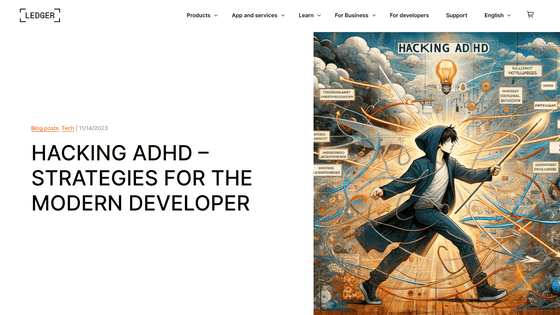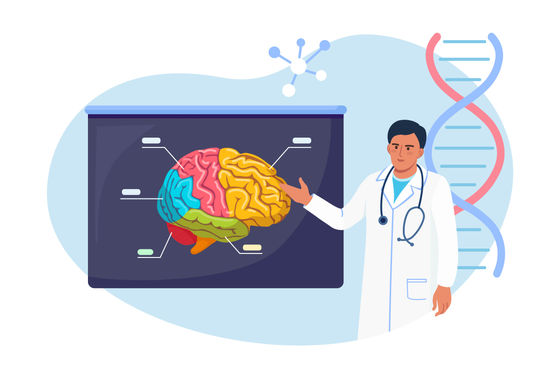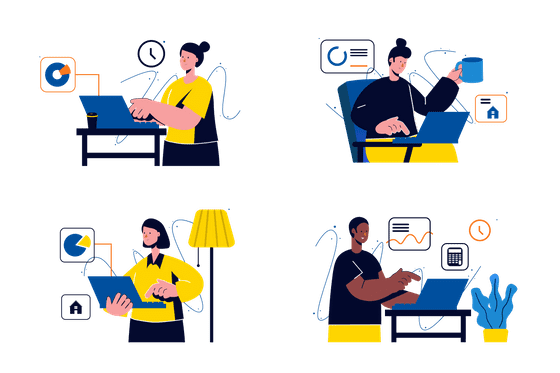How to hack your ADHD traits and boost your productivity

ADHD, also known as attention-deficit/hyperactivity disorder, is a developmental disorder characterized by a lack of concentration and restlessness. While there are disadvantages to ADHD, there are also advantages, such as being able to focus extremely hard on tasks that interest you, and it is possible to improve your productivity by properly adapting to these characteristics. Raphael Lemaître, an engineer who was diagnosed with ADHD at the age of 44, explains these techniques for ADHD.
Hacking ADHD - Strategies for the Modern Developer | Ledger

Symptoms of ADHD are said to become apparent by the age of seven , but many people, like Lemaître, are not diagnosed with ADHD until adulthood. Lemaître analyzes the reasons for the delay in diagnosis in adults as follows:
・Learn how to deal with it
Adults have learned how to use calendars, to-do lists, and alarms to mask ADHD symptoms such as forgetfulness.
·environment
It may be easier for people with ADHD to complete tasks in environments such as schools, where there are frequent tests and deadlines. Challenges in planning and staying focused can become apparent when transitioning to long-term projects or environments that require self-management, such as the workplace.
・Absence of supervisor
Children have a supervisor such as a parent or teacher, but adults have no one to supervise them, so symptoms are less likely to be noticed.
・Social prejudice
There is a common misconception that ADHD is a ``childhood disorder'' or ``a simple lack of willpower,'' making it difficult for adults to consult a medical professional.
・Misdiagnosis
Symptoms of ADHD are sometimes misinterpreted as signs of depression or anxiety disorders.
Lemaître says that although ADHD tends to draw attention to its negative aspects, it is a ``double-edged sword'' that has both advantages and disadvantages for developers, and it is important to focus on its advantages as well.

The advantages and disadvantages of ADHD according to Mr. Lemaître are as follows.
◆Advantages
・Hyper focus
People with ADHD can be highly focused on tasks that they are truly interested in or find rewarding, which is especially beneficial in coding, where being in a 'focused state' tends to lead to high levels of productivity.
・Creative problem solving
Brains with ADHD are highly creative and are often able to think outside the box, making them valuable in software development, which often requires new solutions.
・Rapid adaptation
The rapidly changing technology industry can be an ideal playground for developers with ADHD, as many people with ADHD thrive in dynamic environments that others would find overwhelming.
◆Disadvantages
・Time management
People with ADHD have difficulty estimating how long a task will take, and may procrastinate or panic at the last minute, a trait that can be especially detrimental to development projects with tight deadlines.
・Organizational skills
People with ADHD may find it difficult to track multiple codebases, debug them, and comment on code.
·Consistency
Variability in performance is a concern for people with ADHD. Some days I'm incredibly productive, and other days I get distracted or lose focus and don't get anything done.

Lemaître also explains that people with ADHD often have low levels of dopamine secretion in their brains, resulting in a constant search for stimulation. Dopamine functions as a motivator, encouraging people to perform tasks toward their goals, but ADHD brains lack such desire, and a sense of urgency often appears only when a deadline approaches.
In the pursuit of the dopamine that comes with completing a task perfectly, you spend time fine-tuning the details of a project, spending more time than you originally planned, and the pursuit of perfection can cause you to lose track of other tasks. It is also said that there is a characteristic of forgetting important tasks.
In order to increase the productivity of people with ADHD, it is important to improve the workplace environment and use tools to support self-management.
According to Lemaître, the ideal workspace for people with ADHD is ``a space that provides stimulation without getting in the way,'' and by using multiple monitors to visually distribute tasks, for example, you can keep track of your progress. You can switch between tasks as needed without losing track of your work.
Open office layouts are known to encourage collaboration, but they can also be distracting for people with ADHD. On the other hand, when working remotely, it is easier to concentrate, but there is a problem of isolation. Lemaître recommends switching between in-office and remote work depending on the task, working remotely when digging deep into code or working on tasks that require sustained concentration, and working remotely when doing brainstorming or teamwork. He says that by coming to the office for meetings, project kickoffs, etc., you can get the best of both worlds.

Furthermore, regarding communication methods, it states that while synchronous communication is efficient for quick decision-making, it hinders concentration on work, and recommends asynchronous communication as described below.
・Regular updates
Switch regular meetings to regular written updates using Slack, Microsoft Teams, etc.
·document
Stay up-to-date with tools like wikis, shared documents, and Confluence.
・Discussion thread
Platforms that enable threaded conversations, such as Slack threads and forum posts, allow you to participate in discussions at your own pace.
・Issue tracker
JIRA and GitHub Issues allow you to provide progress on tasks without having to hold a meeting.
・Information sharing through movies
Recording movies is said to be an underrated method of distributing complex information. Using tools like Loom, you can create simple movies that your team members can watch at the right time.
・Amazon's silent meeting technique
Amazon popularized the 'silent meeting' approach, where participants read six pages of notes in complete silence at the beginning of the meeting. This approach allows for deep, focused thinking before the discussion and ensures that everyone in the meeting is on the same page.
While anyone can have a hard time concentrating when their tasks are interrupted by meetings, it can be especially harmful for people with ADHD. In order for each team member to manage their own concentration time, Lemaitre's team recommends actions such as blocking specific times on the calendar and turning off notifications.
On the other hand, it is stated that they have a 'virtual coffee time' every day at 4 pm, not only to emphasize individual concentration but also to ensure the benefit of team interaction. Attendance at the virtual coffee time is not compulsory, so you can foster a sense of community by setting up a time to freely discuss a wide range of topics, from how your work is progressing to chatting about the latest dramas, while ensuring that you don't disrupt your concentration. It is possible to maintain team cohesion.

Lemaître also uses the following tools for self-management.
・Obsidian
Lemaître uses the memo app Obsidian, and says he plans his day every morning based on Google Calendar events and Todoist task list. You can also automatically create notes for each Jira ticket or Google Calendar meeting, save books and articles you want to read through integration with Readwise and Pocket , and save your Google contacts. It allows you to stay organized by linking to many apps, such as linking tasks and related parties.
In addition, he creates notes on a myriad of topics, including drafts of blog articles, and links them to his daily notes. At the end of the day, I review my notes for the day, moving unfinished tasks and adding items I overlooked.
・Reclaim.ai
For time management, he uses Reclaim.ai to automatically schedule focus time.
・Slack
Mr. Lemaitre uses Slack's reminder function , and when he is interrupted by a Slack message in the middle of something, he sets a reminder so that he can check it again later.
・Brain.fm
Lemaître also loves Brain.fm, a music app that helps her concentrate.
Lemaître concludes her blog by reminding us that ADHD can become not just a challenge, but also a strength, if we approach it appropriately and create the right environment.
Related Posts:
in Note, Posted by log1d_ts







